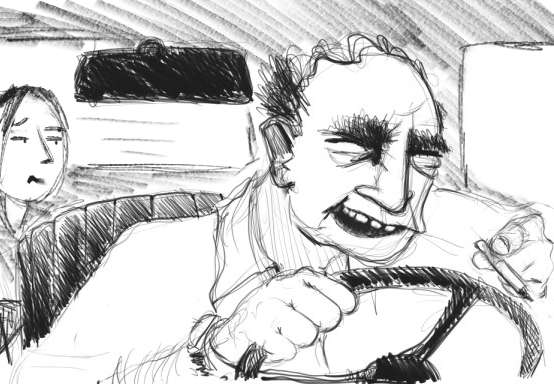Há uns dias, apanhei um táxi e quando chegámos ao destino, um sítio onde era difícil parar, o taxista mostrou a sua perícia e conseguiu deixar-me quase em frente da porta. “Boa!”, exclamei, mas já não tive tempo de dizer “obrigada”.
“Ah!”, interrompeu-me o taxista, “já não se pode dizer BOA… AHAHAHAH!”
Olhei para ele durante um momento, sem perceber nada, até me lembrar que aquele era o dia em que a lei do piropo entrava em vigor.
“Ah, sim, pois… “, respondi, sem demasiado entusiasmo “…suponho que já não podemos…pois …”
Como é costume em Portugal quando alguém conta uma piada, ele teve de a repetir, e ficar a rir-se por mim, enquanto eu tentava pagar-lhe a corrida, receber o troco e continuar com a minha vida (um dia, alguém me há-de explicar a razão por que anedotas e punchlines em Portugal precisam sempre de ser repetidas…).

Depois de sair do táxi, perguntei-me o que seria o assunto de conversa nos cafés de taxistas nessa manhã. Talvez não estivessem a planear a queda da língua portuguesa, mas de uma certa e pequena maneira, é o que vai acontecer.
Mas antes disso, deixem-me dizer qualquer coisa sobre a lei do piropo. É uma coisa bastante ridícula por muitas razões, mas principalmente porque 1) não vai funcionar e 2) vai ser facilmente abusada por pessoas vingativas. Mas como esse é o caso com muitas leis — 1) não impedem as pessoas de as infringirem e 2) há sempre alguém suficientemente vingativo para abusar delas — vamos ver como funcionar esta nova lei. Talvez eu esteja errada. Talvez a lei do piropo vá fazer chegar uma nova era de respeito pelas mulheres (mas não vai).
Mas voltemos à questão da língua. Este episódio da “BOA!”, que sei ir-se repetir, quer dizer que não vou poder voltar a dizer “boa”, pelo menos num táxi. Não porque seja errado dizer “boa” (a não ser que me esteja a dirigir a uma taxista, e eu tenha mudado de sexualidade de um dia para outro e me torne no tipo de pessoa que manda piropos às mulheres), mas porque taxistas, empregados de tascas e espertalhões vão repetir por todo o lado essa piadola do “já não se pode dizer boa… hahahahah”, e nós teremos mesmo de deixar de dizer “boa” ou outras palavras que noutras circunstâncias possam ser utilizadas para piropar, porque nos faltará a paciência para lidar com essas piadolas sem piada. Uma das coisas mais cansativas na vida é ter de rir de uma piadola sem piada.
Vai acontecer, como já aconteceu noutros casos, a começar pelo uso do condicional para pedir qualquer coisa numa loja ou num restaurante.
Quantas vezes, quando educadamente dizia “se faz favor, eu queria um pastel de nata”, me apareceu um empregado espertalhão a dizer “você QUERIA, mas já não QUER?… HAHAHAH”. Um dia, quase deixei de usar o condicional em cafés e restaurantes, simplesmente porque já não tinha pachorra para 1) rir-me de uma piadola que não tem piada, 2) corrigir o cavalheiro e 3) no meu caso, ou antes, no caso de estrangeiros, de repente sentir-me insegura acerca do meu domínio da língua, apenas porque um tuga está a armar-se em espertinho embora eu saiba que tenho razão.
O condicional é uma boa almofada linguística. Não é só um tique português, acontece em outras línguas. “Eu queria/gostava de…”, “I would like…”, “je voudrais…”, “ich möchte…” – servem para suavizar o pedido de alguma coisa quando nos dirigimos a alguém, evitando soarmos como um patrão malcriado ou um grande bebé zangado a exigir “EU QUERO UM PASTEL DE NATA!”
Resisti, e continuo a utilizar o condicional.
E vou continuar dizer BOA, excepto em táxis.
Ora bem, tenham um ano cheio de coisas BOAS.
(traduzido do original inglês pela autora)
You can’t say “Boa!”
One day this week day, I had to take a taxi. We arrived at my destination, a difficult part of a roundabout to stop at, and I said “boa… obrig….”
“OH, you can’t say BOA anymore… HAHAHAHAH” said the driver.
I looked at him for a moment until it dawned on me. It was that day that the piropo law came into force, and the country was in meltdown.
“Oh, yes, ha….” I said, half heartedly, “no, I suppose we can’t.…”
As is so often the way, he repeated the joke and carried it on too long, while I tried to pay him and get my change and get the hell on with my day (someone will explain this to me one day, why jokes and anecdotes and punchlines in Portugal have to be repeated at least once).
I walked down the road wondering what the conversations in the taxi drivers’ cafés had been like all morning. I’m sure they weren’t plotting the downfall of the Portuguese language, but in a tiny way, that’s what’s going to happen, it’s what they will play a part in because of the piropo law.
For what it’s worth, I think the piropo law is ridiculous for many reasons, but mostly for the reasons that a. it won’t work, and b. it will be easily abused by vindictive people. But since that’s the case for most laws — a. they don’t stop people breaking them and b. there’s always someone vindictive enough to abuse them — let’s see how it pans out. Maybe I’m wrong. Maybe the piropo law will herald a new era of respect for women (it won’t).
Back to the language thing, though. It will mean that I won’t say “boa” anymore, at least to taxi drivers. Never again will a taxi driver hear “boa” from my lips. Not because it’s wrong (unless the taxi driver is a woman and I suddenly changed my sexuality and general behaviour overnight and started wolf whistling at women on the street and telling a taxi driver she’s a boazona hotty) but because there will be taxi drivers and tasca waiters and tobacconists and all the espertalhões out there who will make a joke about “boa, you can’t say that anymore…hahahah” and we’ll just give up saying it or any other word that might be used under other circumstances as a word to piropar someone, because we frankly just can’t be bothered with the non-joke. One of the most exhausting things in the whole world is having to laugh at a not funny joke.
It will happen just as it already happens with other things, like the delightful use of the conditional tense to ask for something.
How many times does it take for a waiter to “joke” at you that “você QUERIA mas já não QUER?… HAHAHAHAH” before you start dropping the conditional tense in cafés and restaurants simply because you can’t be bothered with a. laughing at the not funny joke, b. having to restrain yourself from correcting him c. in the case of a foreigner, doubt all your language skills so carefully (kinda) curated over the years because a tuga is telling you you’re wrong when you know that you’re right.
The conditional tense is such a lovely linguistic cushion. It’s not just a Portuguese tic, it happens in other languages. “Eu queria/gostava de”, “I would like”, “je voudrais”, “ich möchte” all softening the blow of asking for something of someone, instead of sounding like a belligerent baby saying “I WANT CAKE NOW”.
I do, however, resist, and maintain the conditional tense.
And I shall continue to say BOA, just not in taxis.
So, BOA ANO to all of you and see you next year (yes, I know).










